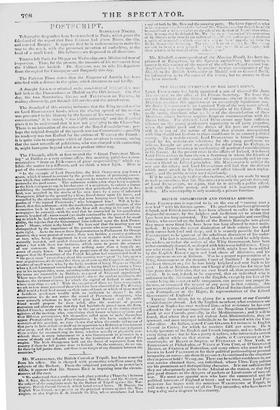The Chronicle, which at first treated the " Great Protestant
Meet- ing" at Dublin as a very serious affair, this mornicig publishes ac om- munication " from an II ish source of great respectability," whieli ex- bibits the matter in a different, and we think a truer light. Here is part of the communieation- 44 In the example of Lord Downshire, the Irish Ormasmen may learn a secret, which if tinned to:we/mat by the peculiar means of producing convic- tion which they cultivated in his case, may soon do wonders in multiplying sup.. porters for the good cause. This nobleman within a few days being required, as the b ish newspapers say, in his character it a magistrate, to enforce a statute prohibiting the insulting party-processions that periodically take place in Ire- land, was assatilted in the streets of his own town by a gang of infuriated Orangemen, felled to the ground by a blow, forced down upon his knees, and compelled by the admonitory bludgeons that %vete hanging over him to ask time pardon of 44 the injured Protestants," who heleagured him ! Will it he be- lieved, that this noblemstn—with the recollection, as one would imagine, of this transaction fresh in his mind—with the blow still tingling in his ears (if the aewspapers be correct)—with the mud that he contracted in his genuflexion scarcely brushed off—turns round (no doubt convinced by the process of reason- ing to which he had been subjected), and proelaims, to the best of his small ability, the injaries that the Government have inflicted upon the Irish Protes- tants ! Shame, where is thy blush? We have said that the meeting was not distinguished by the importance of the persons who were present. We were quite right. As to the two or three Representatives in Parliament for Orange counties, they were present of course; there was, besides, a country gentleman or two, who, being disappointed in tileir counties with the elections, felt matstrally irritabal, and availed themselves of this occasion to evince their spleen ; lint am id' acie few instances, which serve to prove the acculacy of our statement, the meeting was nnthing immure than a beggarly ac- count of empty boxes. To mewl the programme of the meeting, one would suppose that the Paronetage of the United Kirgdom had concentrated itself in am the great room " (everythirg cibilla this meeting was .‘ great "); but, upon a near acquaintance, we di mover the these !peat men are the Cortionifr. mimihi he— retailers of small wares, who, by the lucky ttecislent of being Nlayms or Sheiilfs when a Lori!-Lieutenant entered upon office, or having fitted to a nicety a Vice- roy in his inexpiessibles, were, according to the custom, knighted (or benightel, the terms are convertible in Dublin), as a proof of Viceregal zIppt•ohation ! Where wine the great landed proprietors ?— w hrre the opulent merchants, the bankers, the virtuous citizens, for which the capital of Ireland is emiilent- vhere were titry, we ask ? With the ex;yptiotr of those we have mutt:crated, see ask to how many persons of those who have been chronicled in The Ereniny Mail would a bank lend money on their notes of hand, or which of then would a ftstidions getAletnan trouble with an invitation to dinner ? In this enumeration we da not notice the crowd of Protestant elcrgymen, who were naturally solicitous to hear whit ',Ian Lord RODEN aml his noble friend would propose for their relief, after the sentence of present starvation and ultimate ruin that they had legislatively passed upon the Dta- blished Church ; neither do we refer to the one or two if the noisier clerical agitators of the meeting, who, considering their former religious or: ions and their Milesian patonlymies, felt themselves called upon to make Ilscalselves appear Protestontibas ipsis Protestantions. III this hasty analysis of the materials of this itweting, we have shown that when the smoke and uproar of that party in Irela,o1 that sets itself up in opposition to a Refiwining Government clear away, and that in the calm atmosphere of truth and deliberate judgnient there is time for reconnoitrring its force, whether morally or physically con- sidered, there is every inducement to a wise Government to persevere in a course of steady and inflexible reform itt the institutions of that patt of the empire. The Irish Orangemen bold out the threat of separation from tltis country if there be full justice done to Ireland. On the contrary, do we say, let there he full justice done, and there is no danger of any disuffiou between the couutries."




















 Previous page
Previous page